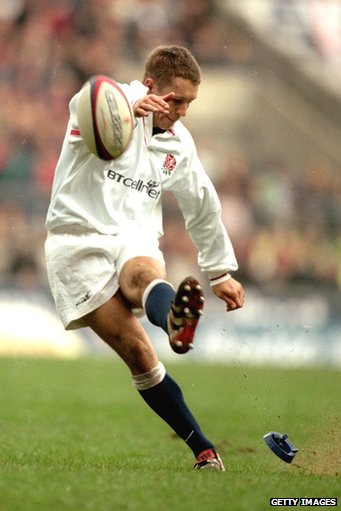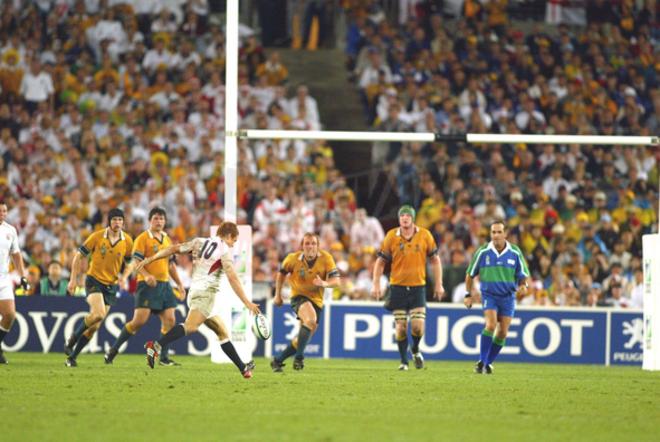Last night’s Heineken Cup final saw Wilkinson lead his Toulon side to Heineken Cup glory for the second year running, with Wilkinson amassing 13 of Toulon’s 23 points on the night. These included two conversions, a drop goal and a long distance penalty, all calmly slotted through the centre of the posts. It was a trademark Wilkinson performance, with everything he kicked turning to gold. He showed is ability to play call and order the back line about. The prime example yesterday was his ability to notice the acres of space to his right, so he consequently ordered Giteau to drop back and kick to the area. It resulted in the first of the sides two tries and led the French side to victory. Defensively Wilkinson didn’t miss a beat helping to quash every potential Saracens attack. It was an all-round solid performance which optimised Wilkinson and his entire career.
Wilkinson started his career back in 1998, at Newcastle Falcons competing in the inside-centre position. He had to compete with seasoned international stars such as Alan Tait and Inga Tuigamala, but Wilkinson battled himself into becoming a regular for the side which went on to win their first league title by one point over Saracens. At the age of just 18, he made his international debut against Ireland on the wing. Wilkinson then cemented himself into the England side, but his first tour was later to be known as the ‘Tour of hell’ due to the heavy defeats suffered by England, including a 76-0 defeat to Australia. Despite this atrocious form, Wilkinson continued to develop hugely as a player and the positional change which would define him came the following season. The departure of fly-half and kicker Rob Andrews, who became Newcastle head coach, meant Wilkinson took over these roles and he never looked back. His seasons in 1999 and 2000 contrasted massively but showed his influence for his sides. Wilkinson was dropped for the quarter-final against South Africa in the World Cup, which saw England lose comfortably. Wilkinson’s influence was proven by the fact the press slated then manager, Clive Woodward for the decision to drop him. But in the year 2000 England won the five nations, with Wilkinson being the main player for England that series.

His career continued to prosper both domestically and internationally, as he led his Newcastle side to the Powergen Cup in 2001, alongside another five nations win with England the same year. Wilkinson’s iconic status was cemented way before the 2003 World Cup, despite the fact he was just 22. In the autumn internationals of 2002, Twickenham was sold out for the matches against both New Zealand and Australia to see Wilkinson. He ended the two games with 43 points out 63 points for his country, as they overcame both sides in two classic encounters.
Then the year 2003 rolled around and Wilkinson became a cult hero for evermore. Wilkinson contributed 77 points to England on their way to a stunning Grand Slam victory, as England routed all opposition. The smallest margin of victory England had all series was 8, which is still a two score lead. The kicking form of Wilkinson was proving too much for the northern hemisphere sides to cope with, but the world cup proved his trusty kicking boot can derail any side. During the world-cup he scored all 24 points in the semi-final verses France, to take England to the World Cup final and a chance to win their first ever World Cup. In the final we saw the moment that no England fan will ever forget, the beautiful sight of Wilkinson dropping deep in the pocket to attempt the drop goal. The minute the drop goal went through the posts his legendary status in England was confirmed, but he wasn’t finished here.

However not the last time in his career Wilkinson was plagued with injury. In the years following the World Cup, he suffered from a broke facet in his shoulder, a haematoma in his right arm, his medial knee ligaments which eh injured again on his return match, he then suffered a stinger injury on tour with the British and Irish Lions. Things got worse for Wilkinson has he then suffered appendicitis and later sportsman hernia. Wilkinson was not truly fit until the 2006-2007 season in which he excelled and fought his way back into the England set up for the 2007 World Cup.
Wilkinson was again influential for the World Cup side and led England to the final for the second tournament in a row, only to be beaten by the Springboks. His last international trophy came in 2011, when England won the six nations, Wilkinson’s fourth. Wilkinson did however achieve several personal milestones including; passing 1000 international points, a record 29th international drop goal, breaking the record for most international points and then surpassing Ronan O’Gara for most points a player has scored in a Six Nations.
In 2009 Wilkinson moved to French giants winning back to back Heineken Cups in 2013 and 2014. In both finals Wilkinson was the influential player, as he kicked multiple penalties, conversions and drop goals to dominate both games.

With his retirement rugby fans will be missing a simply sensational player who amassed, 4,427 points in his entire career. Which is simply sensational if you take into account his injury issues he suffered for several years. Even to this day Wilkinson is still sat in second place, in test points only behind Dan Carter. But fans will also miss out on a true gentlemen, not only a talented player. Not a player to hog the limelight not many players ever have a negative word to say about the rugby hero. It is a sad day to see Wilkinson retire and all rugby fans of this era can proudly say they have seen a true great grace the turf, who takes his place in Rugby’s hall of fame.









































